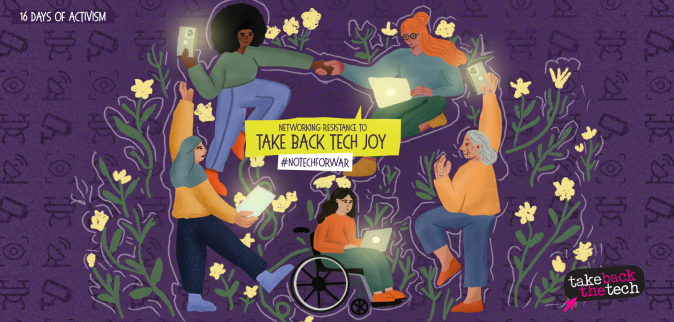#NoTechForWar: Networking resistance to #TakeBackTechJoy for 16 Days of Activism Against Gender-Based Violence 2025

Crédit image
The realities that WHRDs face in their local contexts are increasingly shaped by global politics of war and technologies that enable genocide, whether deployed by governments, corporations, or other powerful actors.
It matters now, more than ever, as technologies become ever so sophisticated — and Women Human Rights Defenders (WHRDs) risk their lives to secure civic participation, also more than ever.
The work and advocacy of WHRDs are especially politicised and vulnerable, particularly in politically repressive geographies, and around sensitive issues like gender and sexuality.
Disinformation and defamation campaigns target their legitimacy through personal attacks to reduce their credibility. As a result, they’re harassed, threatened, and silenced.
In 2024, Front Line Defenders reported that WHRDs were among the most frequently targeted human rights defenders worldwide — ranking within the top three most at-risk groups in nearly every region. WHRDs face a range of attacks, including smear campaigns, criminalisation, arbitrary arrests and detentions, and threats — often involving sexual or gender-based violence.
Across the globe, WHRDs are at the forefront of movements for justice and equality, from reporting on dangerous war environments to confronting dictators. They also carry immense burdens in conflict and crisis contexts, as seen in Palestine, Colombia, the Democratic Republic of Congo, Myanmar, Sudan, Ukraine, and elsewhere in the world.
WHRDs face a myriad of attacks from multiple fronts when they demand justice and rights for their communities and for themselves. These attacks are not only orchestrated by anti-rights and anti-gender groups, but oftentimes also involve state-backed repression in the form of disinformation, digital surveillance, stalking and hacking which are still urgent issues WHRDs face.
But despite this, activists and defenders continue their work in a remarkable display of hope and care. They ground resistance in rest, transform fear, create community to lean into joy and the companionship that is the basis of all political solidarity.
As we hold these two seemingly contradictory spaces together — after all, joy and safety is hard to come by in environments where we are surveilled, and pushed to simply survive — we ask you to collectively think and explore with us:
- The erosion of legal safeguards and the normalisation of extrajudicial surveillance — and what it means for WHRDs.
- The risk of burnout for WHRDs — how we might hold space for this, and how to navigate it.
- The gendered manifestations of surveillance and disinformation in a hostile political space — smear campaigns, official detainment, psychological violence, and challenges with government actors.
- The higher risks faced by WHRDs working on indigenous ownership of land and territories against extractivist governments and corporations — and how digital security comes into play.
- How targeted attacks — both sexualised and dehumanising — seek to discredit WHRDs’ intellectual and political capacities, as well as erode their legitimacy as public figures.
…and really, so much more. We will be featuring the voices of WHRDs talking about their personal and political journeys from across diverse geographies, and deep dives into how vested interests use surveillance and Big Tech in an attempt to silence WHRDs.
We also invite conversations and thoughts on the false promises that generative AI brought with its commercial availability — and how we may navigate it in our activism and our lives. The physical reality of massive data centers are exploiting both environments and workers, and the digital vapor of GenAI, of course, exists on the basis of stolen art, writing, and research. We would be glad to read your research, opinions and questions during the course of these 16 days.
We will feature snippets from our Feminist Tech Joy grants — that interrogate power and incorporate care — from across local contexts.
We will also be hosting a Feminist Learning Circle that aims to build our capacities against stalking — both in intimate relationships and in situations that might lead to surveillance — and nurture digital community against the legitimate risks and dangers all WHRDs have to contend with today.
So even though we say #NoTechForWar, we will always make space to #TakeBackTechJoy.
- Log in to post comments
